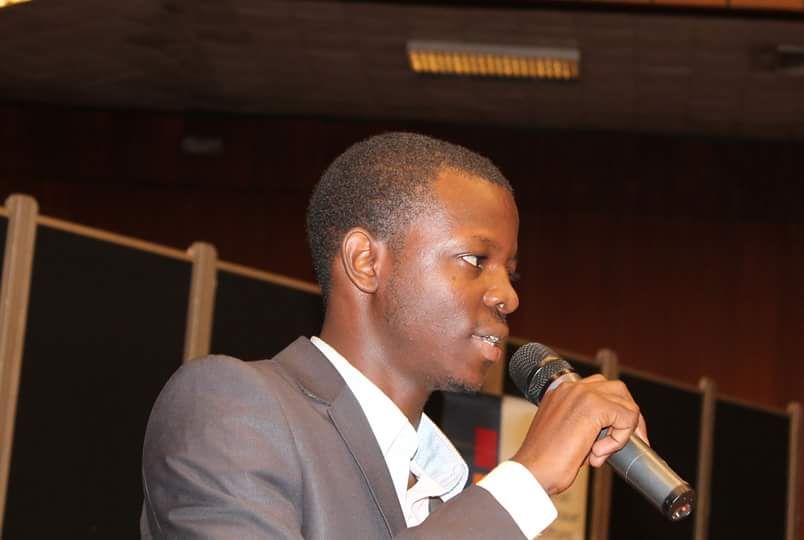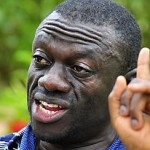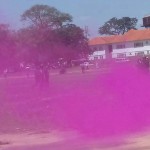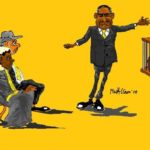By Ivan Okuda
Two columnists whose writings I respect published in a decent publication, ‘The Observer’ insightful articles, both of which, albeit one following the other or rather premised on events accruing from publication of the first, hinged on what the distinguished gentlemen writers aptly described as the rise of radicals in Uganda’s leading opposition party, the Forum for Democratic Change.

The impression created: These radicals, who are wont to throw stones at whoever questions Almighty Alpha and Omega (that is what they make him appear) Dr. Colonel Kizza Besigye, son of Kifefe of Rukungiri, are fast rising. We aren’t safe no more. Kampala is under attack. The bees are out of the political hive of Kasangati and more wasps from Katonga nests are out to sting anyone who dares question the brave Colonel. Run for dear life, sprint faster than Usain Bolt lest they call you a mole, and Photoshop pictures of you receiving monies from the emperor of Rwakitura’s errands girls and boys. Victims of their extremist politics know no bounds. Ssemujju who was with them yesterday is today, fast and furious, plunged to the alleys of ignominy. The radicals are on the loose and Dr. Besigye is to blame. House on fire! Bomboclat!
The other view: Both Dr. Moses Khisa, a robust academic with impressive intellectual rigour, and Kira MP Mr. Semujju Nganda, one of my favorite politicians, aren’t exactly breaking any news in their latest bemoaning about extremists in FDC aligned to Besigye.
If anything they are chewing cud on what has already been stated ably and in equal passion and persuasion, nay, dexterity of articulation by among others illustrious journalist Andrew Mwenda, and in an interview this year, by Mr. Abdul Katuntu, MP, and possibly one of the finest brains in our August House. Maj. Gen. (rtd) Mugisha Muntu, a polished politician and gentleman of impeccable qualities, too, has in his trademark measured speak pointed fingers at the nest of these radicals, who are hatching a dangerous breed of politics so corrosive that whoever doesn’t subscribe directly or indirectly is denied rites of passage into and by Pax Besigyenica. In other words, they are unwashed in their opposition to Gen. Yoweri Kaguta Museveni if they don’t sing the chorus from the hymn book of Ingrid Turinawe, Mubarak Munyagwa and choir master Nathan Nandala Mafabi. Part of the creed, that qualifies this group to be tagged, ‘radicals, extremists, fanatics’ and other words of derogatory flavor, including, ‘the most stupid people’ as Mr. Mwenda described them recently, is that they are intolerant to anyone anti-defiance, and who dares take on, even criticize Almighty Besigye and his approach to change. Worst of all, the critics say of this group, for which I speak not but merely comment about as an observer of politics of our beloved Republic, they are not even organized and are opposed to building structures (never mind that those who say so do so on the premise of structures built under the stewardship of the ordained cult leader of this fanatical group). Never mind also that defiance and party structure – building are not mutually exclusive or even contradictory. One can be organized in their defiance as Mr Yoweri Museveni and his NRA was (1981-1986). An impression is created to the public that there is an ideological contest in FDC. Of course that would be over rating FDC as it is not a party in the real sense of say, UPC, DP, CCM, ANC but for all intents and purposes a pressure group that mutated through law and paper work into a party but is largely a group of power seeking individuals to whom such ideals and high flying talk as ideology and God knows what else is utopian. Like father (NRM) like daughter (FDC).
Back to the Besigye radicals:
What is the sum total of all this? What Besigye’s critics or better still haters of radical politics say is largely true. Factually they are accurate in diagnosis of what’s happening at and to FDC. But life is not only about facts. It is also about issues, the reason why in criminal law, if you killed person X, (a fact), the court and indeed prosecution and defence are duty bound to go into and dissect the issues, among which, is whether this was premeditated, sometimes even delving into motive. So killing per say, factual as it is, isn’t enough to get you into Dr. Johnson Byabashaija’s safe custody. There are a host of underlying issues that must be addressed for the offence of murder to suffice. Similarly it is not enough to state a fact such as the existence of ‘radicals in FDC’ and bemoan the obvious danger that comes with and not delve into other issues such as ‘why’ and the context of the same.
So what are the issues? One of the issues articulated by critics of Besigye and his radical foot soldiers is that they are intolerant to criticism. I am not sure this is entirely true considering that a number of people of respectable opinion who have worked with Dr. Besigye actually say he is accommodative of divergent views and like Gen. Museveni, will coil his tail if that will help create harmony in the ship so it gets ashore. Mr. Wafula Oguttu, a known Besigye supporter, who despite being biased, is at least, on the basis of corroboration of his view, recently recounted to me several instances when Besigye has had to abandon positions in meetings, including when he passionately sought to have Ms. Cecilia Ogwal, MP, appointed as Leader of Opposition. He presented the name in the meeting and members disagreed, arguing she was new in the FDC waters, and the deputy LoP (not provided for in the structure but suggested by the Colonel) could as well do the job. The forces behind Ogwal’s nomination were powerful, some say including his wife, Ms. Winnie Byanyima, an FDC historical. Besigye swallowed humble pie and let go. Talk to young men and women in FDC’s rank and file and they will tell you how engaging Besigye is and amenable to other views, sometimes painfully abandoning his positions. So it is not entirely true that he has become a demi-god. Gods aren’t questioned. Their word is law. L’etat c’est moi!
May be they (supporters) adore him but you can’t fault someone for being popular and adoration isn’t necessarily blind loyalty when the likes of Ssemujju who hold Besigye in high regard can depart from his candidate of choice (albeit not publicly stated—Patrick Amuriat Oboi) and opt for Mr. Muntu and maintain cordial relations with him. Of course some members of the party, as Ssemujju stated, are fanatically supportive of Besigye, as there will be those fanatically supportive of Museveni, Mr. Amama Mbabazi (SC), Norbert Mao, Trump, Kony, Sejusa, Wayne Rooney or even Arsene Wenger with all the torment Arsenal is subjecting its fans to of late. It appears therefore that being fanatically attached to someone isn’t evil after all. We all have things/people/places/issues we can be accused of being fanatically inclined to and that should be fine. We are human. Not everyone shall be a moderate.
The challenge with the radicals?
The issue those opposed to these radicals have is intolerance that manifests in such crude political stunts like mudsling and defamation of those who disagree with them. Fair enough. The fact is stated. The issue though is, what is the context of this intolerance? First, I see no legal or moral issue with a politician or his supporter being radical as long as that extremism (as in the case of FDC) doesn’t border on criminality. The dangerous radicalism we should dread is the type exhibited by Besigye, Mbabazi, Muntu, Museveni and group when they took to the bushes (in an act of treason and terrorism) against the people and state of Uganda and waged what for all intents and purposes was an ethnic war (west vs north—‘badokolo’) sugar coated with such little niceties as captured in the 10 point program.
I am yet to see however, what is dangerous and criminal about the forms of what critics of Besigye and his supporters call extremism? What is intolerance anyone? Who defines it and what parameters are used? What you call intolerance could as well be gagging people from enjoying constitutionally and internationally guaranteed freedoms and rights (to wit—speech, expression, conscience and thought).
I find wisdom in this paragraph by Archibald Cox in Society Vol.24 p.8 No.1 Nov./Dec. l986 –
” Some propositions seem true or false beyond rational debate. Some false and harmful political and religious doctrines gain wide public acceptance. Adolf Hitler’s brutal theory of a “master race” is sufficient example. We tolerate such foolish and sometimes dangerous appeals not because they may prove true but because freedom of speech is indivisible. The liberty cannot be denied to some ideas and saved for others. The reason is plain enough; no man, no committee, and surely no government, has the infinite wisdom and disinterestedness accurately and unselfishly to separate what is true from what is debatable, and both from what is false.”
How can FDC be part of the efforts to foster democracy when some views held against some leaders are considered too radical that they should be thrown to the fire especially if radicalism offends no law or moral virtues of our society and is within the ambit of acceptable political propaganda which all political entities exercise?
Critics of the radicals in that party surely ought to appreciate that in bemoaning how intolerant their peers are, five fingers point at them too. I sense a latent fear for scrutiny and criticism among those who are quick to write derogatory words about ‘Besiggye radicals’ considering the wisdom in this statement, in this judgment in the Lingens Case, (No.12/1984/84/131), where the European Court of Human Rights said -“freedom of expression, constitutes one of the essential foundations of a democratic society and one of the basic conditions for its progress and for each individual’s self- fulfilment. It is applicable not only to “information” or “ideas” that are favourably received or regarded as inoffensive or as a matter of indifference but also to those that offend, shock or disturb. Such are the demands of pluralism, tolerance and broad-mindedness without which there is no “democratic society”.
Even more, in Muwanga Kivumbi vs Attorney General, Justice Constance Byamugisha (bless her soul) reminds us that to allow for enjoyment of the greatest possible freedom, democratic societies (like FDC—emphasis mine), should tolerate the greatest level of annoyance. Now, if members of the FDC are so weary of being annoyed by so called radicals, how shall they run affairs of the state where criticism is the order of the day, including lies and exaggerations? Don’t they make Museveni whom we lampoon on TV/radio/columns and cartoons by Chrisogon look like an angel as he often allows to be a punching bag of ridicule? The president tolerates some annoyance, why can’t those calling for radicals to be put to order pick a leaf?
The radicals should therefore have liberty to attack (VERBALLY) those they suspect to be moles or working against their course (even based on mere suspicion) and indeed those who detest radical politics should have the humility to recognize, as we see above in the cited cases, that democracy involves accommodating some annoyance. Sadly there is no room for this in FDC hence the tag, ‘radicals’ is thrown around to evade criticism.
Be that as it may, let’s also ask and seek answers to the question of context. There is context of history and culture to the conduct of these radicals. We live in a country where tomorrow you will wake up and see a politician (as we saw with Maj. (rtd) Rubaramira Ruranga who led a hostile and beastly campaign against Muntu when he ran against Mafabi, cross to the NRM, leaving those who always called him a mole licking their lips and winking, “we told you.” There are hundreds of ‘we told you’ ‘we always knew it was a matter of time’ in our political and media space. People are free to cross from FDC to NRM but the point is, the last 15 years have been characterized by supermarket politics. FDC is a huge supermarket from which Mr Museveni’s apparatus easily shops the next ripe vegetable so much so that the only people you can trust in that party are Mugisha Muntu, Kizza Besigye and by extension, Erias Lukwago. The rest? You surely can’t take their word to the bank. It could bounce. Listen to them, engage but keep your eyes open. Big brother could be listening. Uganda’s politics is so transactional that you cannot even trust your own shadow.
Therefore one understands why people treat anyone who attacks Muntu, Lukwago, Besigye, Mao or anyone else committed to the struggle for change with the vitriol the radicals spit. Is the problem then with radicals or the nature of our transactional politics that has built such a toxic atmosphere that even at family level if one member secretly met the president other members would be up in arms and start to watch their backs, calling the other a traitor? That doesn’t appear to me, as radicalism, it is, everything about and more to do with the nature of politics. To focus on why people in FDC act the way they do (out of mutual mistrust and suspicion for those who disagree with them due to a history of flip-flopping) is to cut the branches and spare the cancerous root.
At the risk of whataboutism? Let’s for argument sake ask if FDC radicals are the biggest worry to this country where you have the NRM that rose to power on the basis of participation in a civil war (conveniently called a liberation struggle) for five years. There was wanton killing and misery unleashed by both sides of the war. When NRA/M got power in 1986, they used radical methods to hold that power, including illegal arrests and torture, muzzling political space for DP and UPC, and mass murder in counter insurgency operations for which the president, to admit excessive force was used, has apologized and promised to bring the culprits to book.
Whenever the presidency has been threatened, NRM regime’s response has been terroristic so much as to, with least concern for human rights, release the gods of bloodshed as we saw in Kasese. NRM’s radicalism even gets worse with elections as we witnessed in 2001, 2006 and 2016. Read the 2001 and 2006 election petitions to appreciate how radical NRM is. When Mr Museveni’s power has been threatened peacefully, we have seen how the likes of Amama Mbabazi have been treated, like outcasts with political leprosy. People are jailed, testicles crushed, their businesses are frozen, for illustrious citizens like Olara Otunnu and Mzee Yona Kanyomozi they cannot be supported to get international jobs simply because they have a different outlook to governance. Those who break ranks suffer economically, business contacts are asked by ISO/CMI to cut links. Isn’t this the more worrying trend of politics, that has become near official in Uganda which we must all strive to contribute to change? How does FDC act when Besigye stands as flag bearer? We haven’t seen the radicals unleash violence on say Muntu supporters whenever the two bush war comrades have contested against each other for flag bearer. When Mafabi (call him a radical) stood against Mr Muntu (non radical) the two groups didn’t exhibit violent forms of radicalism. The only traceable evidence of radicalism in FDC is the use of words which as we have seen above, can be taken care of under the ambit of freedoms any democratic institution must bear with. Caricatures, false claims and even lies, as Archibald Cox has argued, could as well be excused, in the competition for political space, as part of the propaganda games. That cannot be radicalism.
So what is the hullabaloo about FDC radicals? It is healthy to caution ourselves every now and then that if FDC acts in ways that can potentially return Uganda to the dark days of NRM/Idi Amin/Milton Obote radical treatment of opponents that should be nipped in the bud. But so far what we call radicalism in FDC is mere freedom of expression, which though not absolute, is still within acceptable limits of ‘reasonable annoyance’.
It is being over played, in my humblest view, by people who want to be immune to scrutiny and criticism and are conveniently oblivious of the context of a muddled political environment where mutual mistrust is the order of the day.
By continually attacking this group as radical and therefore essentially criminalizing (mentally) the same, relegating them to the region of outcasts, we risk falling into the trap of gagging people, frustrating their enjoyment of constitutionally guaranteed rights of speech, freedom, expression and conscience. A political party like FDC should allow for cross pollination of all world views, including radical ones, especially before they get power.
Ivan Okuda is a Post Graduate Diploma in Legal Practice student at the Law Development Center and Special Projects/Investigations writer with the Daily Monitor








